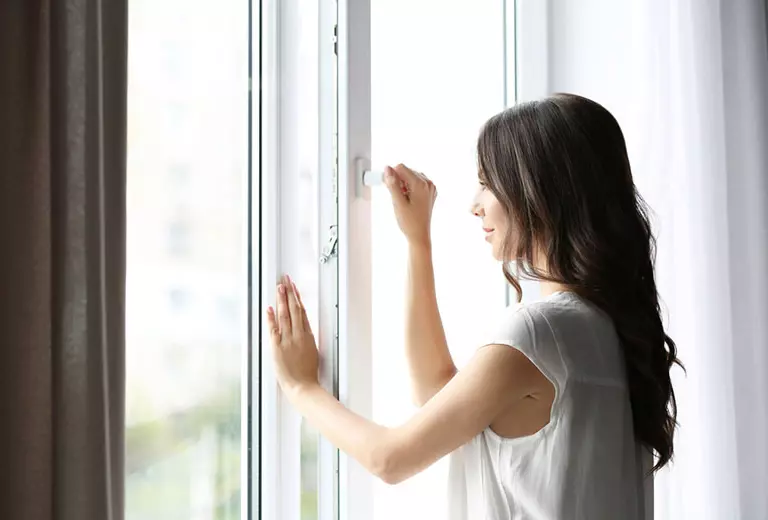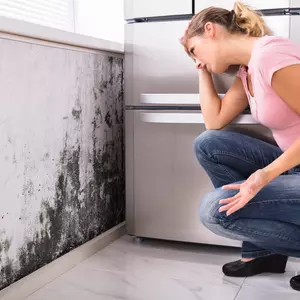
Ventilating properly in the summer
Proper ventilation is just as important in summer as it is in winter. While winter is all about trying not to lose too much heat through the ventilation system, the main objective in summer is to prevent too much heat getting in. The indoor humidity must also be kept at a comfortable value no matter the season.
You also need a sufficient flow of fresh air from the outside to lower CO2 levels inside. Read on to find out the best way to ventilate your home in summer.
Why is it so important to ventilate your house properly in the summer?
By showering, washing, cooking and even breathing, an average three person household puts between 7 and 15 L of water into the air inside their home every day. If you put washing up to dry or have an aquarium, these can also increase the humidity level.
This can be a problem if you have a well-insulated home due to the lack of air being exchanged with the outside. This can reduce the amount you spend on heating in the winter, at the expense of the air in your home feeling stale.
If the air in your home is particularly humid over the summer months, you may start to see mould appearing. That’s why ventilating your home properly in summer is so important.
How to ventilate your home properly in the summer
In summer, the main point of ventilating your home is to reduce the humidity and the temperature indoors. Temperature is measured with a thermometer, while you can use a hygrometer to measure air humidity.
The best time to ventilate your home is when the temperature and air humidity outside are lower than in your home. In summer, the only time of day when this is the case is early morning, evening or night-time.
Different rooms have different ventilation requirements
Living room and study
An air humidity level of 40 to 60% is ideal for your living room and study. In the summer, humidity levels are usually around 60% or higher. That’s why ventilating these rooms properly in the morning and evening is so important.
To do this, open your windows as wide as they will go for around 20 minutes. If you can get a cross-breeze going, that will speed up the process. The best way to do this is to fully open two windows across from one another so that they create a draught. Make sure that your windows are open all the way; just opening them a crack won’t be effective.
Bedroom
You should aim for an air humidity level of between 40 and 60% in your bedroom as well. Ventilating your bedroom is particularly important because you spend a lot of time here. The best time to do it is in the morning and the evening.
Bathroom and kitchen
The humidity level in your bathroom can be a bit higher – between 50 and 70%. The main activities that can cause air humidity levels to skyrocket in a bathroom are showering, having a bath and washing. Make sure to open your windows at regular intervals to keep air humidity levels within an acceptable range.
Ideally, the humidity level in your kitchen should be between 50 and 60%. Cooking food can cause it to go up significantly. Make sure to open your kitchen windows fully at regular intervals.
Loft
Lofts are famous for trapping heat. However, if you simply kept your windows open you would just be inviting even more heat into your home.
Keep the windows closed in any rooms you have that are directly under your roof. If you can, keep the curtains or blinds closed as well. There’s no point ventilating rooms directly under your roof any time other than the morning and evening.
Rooms that you rarely use
You should ventilate the rooms that you rarely use – like a guestroom or the hallway – whenever you get a chance. Moisture in the air can get trapped in these rooms, leading to mould.
If a room doesn’t have a window, try to get a cross breeze going from elsewhere.
Basement
The basement is likely to be the coldest room in your home. Air humidity levels of up to around 65% are perfectly acceptable in your basement. Any warm air which goes into a cold basement during the day will condense quickly.
This condensation will accumulate on your walls, leading to mould. That’s why you should only ventilate your basement early in the morning or in the evening.

Tips for ventilating your home properly in the summer
Here are some tips which will help you to ventilate your home properly in summer:
Opening your windows as wide as they will go is the best way to get fresh air in from the outside.
You should also try and create cross breezes whenever this is possible.
After ventilating in the morning, you should close your curtains and put your blinds down. The less heat a room gets from sunshine the better.
Turn off any electrical equipment that you are not using as it can generate additional heat.
Take the time to mop up any condensation in your bathroom after having a shower or a bath, and make sure to ventilate the room.
An extractor fan can help you reduce the air humidity in your kitchen.
Try to dry laundry outside whenever possible.


